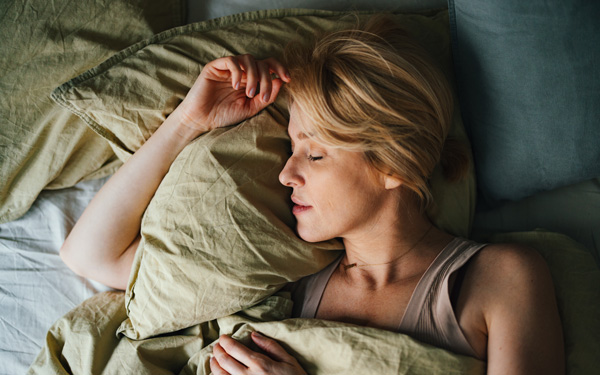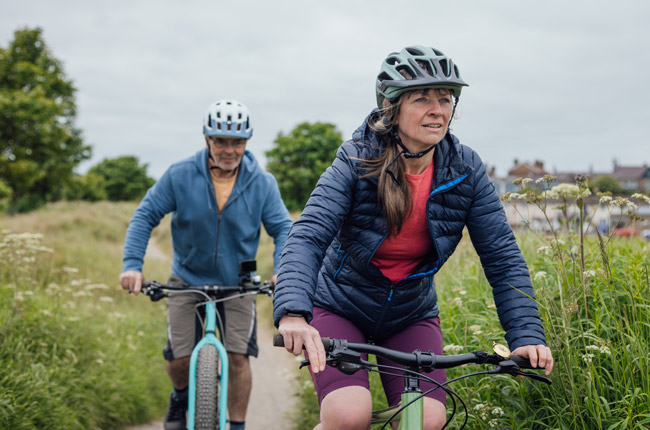Sleep plays an important role in leading a healthy life. Not only does it help you feel refreshed and increase your energy levels, sleep is critical in maintaining your overall health, such as helping to regulate your blood sugar and reducing stress levels.
But have you wondered if there’s a connection to cancer? Marianne explores the research on sleep and cancer, and provides 5 top tips on how to improve your sleep quality.
How bad is lack of sleep?
Lack of sleep can be due to a range of factors, such as stress or hormonal imbalances, or consuming stimulants. An analysis of 24 studies showed that caffeine consumption reduced total sleep time by 45 minutes, and increased the proportion of time spent in “light” relative to “deep” sleep. The authors concluded that caffeine should be consumed at least 8.8 hours before sleep to avoid any potential negative effects.
The European Food Safety Authority says that regularly having up to 400mg of caffeine (that’s around 4–5 cups of coffee) a day does not give rise to any concerns about adverse health effects. For pregnant or breastfeeding women, having up to 200mg of caffeine per day (around 2–3 cups of coffee) is safe.
However, the association between cancer and sleep is not straightforward; stress and lack of sleep can make unhealthy eating habits and lack of exercise more likely, which in turn can increase the risk of overweight and obesity. This has been shown to increase the risk for several cancers.
For people who work shifts or during the night, there’s evidence suggesting they are more likely to develop some types of cancer, such as breast and prostate cancer. This is likely to be because people who work shifts are less likely to get enough sleep, making it harder to make healthy choices, and are more likely to develop overweight or obesity.
The NHS recommends adults get 7–9 hours of sleep per night. Yet a study published in Clocks & Sleep revealed that the protective effects of sleep are not being felt by everyone, as almost a third of 40–69 year-olds in the UK do not get the recommended amount.
New research on sleep and cancer
One of our grant holders, Dr Matty Weijenberg, is looking into sleep quality, fatigue and inflammation after bowel cancer treatment. This research will help us understand how eating and exercise patterns are linked with sleep quality over time in people living with and beyond bowel cancer.
More research is still needed before we can say if there is a direct link between sleep and cancer. That’s why we’ll be focusing more on sleep and cancer through our groundbreaking new project, the INSPIRE Research Challenge, where early career investigators will be researching how sleep, stress and the environment impact cancer prevention, treatment and survivorship.
Dr Christos Chalitsios in Greece is investigating the impact of sleep on the development of reproductive system cancers, while Dr Shan Luo in Hong Kong is exploring the links between sleep patterns and breast cancer risk. We hope that these studies will help fill the gaps in our knowledge.
How can I get more sleep?
- Eating a healthy, balanced diet that is rich in wholegrains, vegetables, fruit and beans helps protect against cancer, but in combination with staying more active it may also help with your overall sleep quality by helping to maintain a healthy weight. Studies have shown that living with overweight or obesity can increase the likelihood of sleep disturbances. Aim to get at least 5 portions of fruit and veg a day.
- Sticking to a set routine every night can help your body know when it’s time to sleep, which can have a positive impact on your sleep. Shift workers can find it more challenging to stick to a set bedtime, but try to stay as consistent as you can. If you’re able to, try to wind down at least an hour before you go to sleep, and avoid looking at screens – whether it’s your phone or TV.
- For some people, too much caffeine before bed can also cause disrupted sleep, so try to limit the amount you drink every day. Opt for decaffeinated hot drinks instead, such as chamomile tea or a mint tea, and avoid drinking caffeine in the evenings. Too much of any liquid can also disrupt your sleep!
- Reducing the amount of alcohol you drink can improve your sleep quality. While you may feel tired and think that alcohol helps you fall asleep, it is likely to decrease the quality of your sleep. Limiting your alcohol intake is also important to help prevent several cancers, including breast, bowel and liver cancers.
- Adding exercise, such as brisk walking, gardening or cycling, to your daily routine can improve sleep quality. We’re advised to do at least 150 minutes of moderate-intensity physical activity (such as household chores, swimming or dancing) or 75 minutes of vigorous-intensity physical activity (such as running, aerobics or fast cycling – anything that makes you sweat) – but it’s best not to do this too close to bedtime as you may feel quite wired before dropping off.




